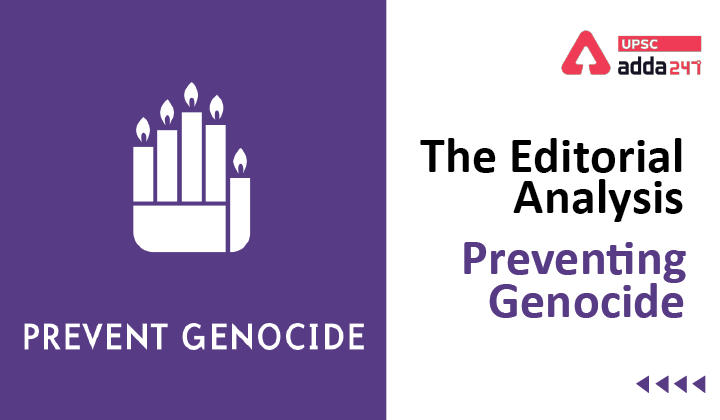Table of Contents
Preventing Genocide- Relevance for UPSC Exam
- GS Paper 2: International Relations- Bilateral, regional and global groupings and agreements involving India and/or affecting India’s interests.

Preventing Genocide- Context
- In the last few weeks, incendiary speeches by Yati Narsinghanand at a religious assembly have reignited discussion regarding hate speech, and the limits of the law.
- The speeches made include calls for the genocide of Muslims in India.
- India has signed and ratified the Convention on the Prevention and Punishment of the Crime of Genocide of 1948, putting international legal obligations on it to act against genocide.
Davos Summit 2022 | World Economic Forum’s Davos Agenda 2022
Convention on the Prevention and Punishment of the Crime of Genocide of 1948
- Background: Raphael Lemkin is credited with the use of the term ‘genocide’ and campaigned relentlessly for it to become an international treaty.
- In 1946, Cuba, India and Panama co-sponsored General Assembly Resolution 96(I), which affirmed genocide as a ‘crime under international law’.
- About: A Draft convention on the prohibition of genocide was passed by the General Assembly in 1948 and came into effect in 1951.
- Members: Presently, more than 150 states are party to the Convention on the Prevention and Punishment of the Crime of Genocide of 1948.
- Mandate: Convention on the Prevention and Punishment of the Crime of Genocide of 1948 work towards prevention of genocide as well as the punishment of the crime.
- Legal Obligation on the Parties: Legal obligations on states that are party to the convention include the obligation-
- Not to commit genocide, to prevent genocide, and to punish genocide (Article I),
- To enact legislation to give effect to the provisions of the convention (Article V);
- To provide for effective penalties for those found guilty of criminal conduct (Article V); and
- To try those charged with genocide in a competent tribunal (Article VI)
India-US Homeland Security Dialogue
Preventing Genocide- Issues with the Indian Legal System
- Lack of adequate legislation: there are no comparable provisions for the prosecution of any mass crimes, least of all genocide.
- Indian Penal Code provisions relating to rioting, unlawful assembly and ‘promoting enmity between different groups’ do not embody the basic elements of the crime of genocide.
- Crime of Genocide is committed against a collectivity or a group, with the specific intent to cause its destruction.
- Lack of legal provisions preventing genocide and creating the conditions in which hate speech and other associated acts are not allowed to flourish.
- These hate speeches may facilitate the commission of genocide.
Preventing Genocide- Recent International Legal Development
- Myanmar Genocide: The Gambia has initiated proceedings before the International Court of Justice (ICJ) against Myanmar on the basis of the Genocide Convention.
- Key Observations: Genocide Convention embodies can be invoked by a state that may not be specially affected (on the basis of being part of the community of states).
- The ICJ is relying on a previous case of Belgiumv. Senegal for accepting the Gambia case against Myanmar.
- Bosnia and Herzegovina v. Serbia and Montenegro case 2007: ICJ addressed the question of violation of the Genocide Convention in the Case Concerning the Application of the Convention on the Prevention and Punishment of the Crime of Genocide.
- In its final judgment in 2007 the ICJ found a failure to prevent genocide by Serbia.
- The breaches of the Genocide Convention related to the obligations to prevent and the lack of cooperation, but not for the commission of genocide.
Preventing Genocide- Conclusion
- It is more imperative than ever that international legal protections against genocide are incorporated in the domestic legislation of its Parties including India.
The Editorial Analysis- Space for Dreams



 TSPSC Group 1 Question Paper 2024, Downl...
TSPSC Group 1 Question Paper 2024, Downl...
 TSPSC Group 1 Answer key 2024 Out, Downl...
TSPSC Group 1 Answer key 2024 Out, Downl...
 UPSC Prelims 2024 Question Paper, Downlo...
UPSC Prelims 2024 Question Paper, Downlo...
